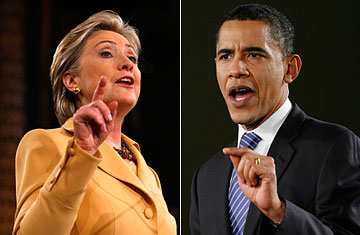
Democratic presidential hopefuls Hillary Clinton (l) and Barack Obama (r) campaigning on the eve of Super Tuesday, Feb. 5, 2008
For a week, no plane ride or press conference could pass without Barack Obama's spokesmen and surrogates lamenting the power of the Clinton machine. Three days before Super Tuesday, Obama's campaign manager, David Plouffe, even warned in a campaign memo that the opponent was so mighty that Obama might have a tough time winning a single contest outside of his home state of Illinois. After Obama's 13 state wins on Super Tuesday, compared to Hillary Clinton's 8 (with New Mexico still too close to call), either Obama's spin doctors are very good or his pollsters are historically bad.
"The momentum has shifted in this race," said David Axelrod, Obama's chief strategist, declaring Super Tuesday a "crystal clear" victory for Obama. "Obviously, [the Clinton campaign] have some things that they are going to point to, but in terms of the breadth of Senator Obama's appeal, winning in every region as he did, competing as strongly as he did coming from as far behind as he has nationally is quite an achievement."
Underdog is a mantle Axelrod refuses to shed, even though Obama now leads in overall fund raising and state victories, with 15 to Clinton's 12. (By CNN.com estimates Clinton still has a slight lead in the delegate tally.) "I just think that when you're universally known," said Axelrod of Clinton, "and you've got 16 years of institutional relationships around the country, that gives you the advantage. No matter how many times you ask me I'm never going to give up the underdog status."
Still, both campaigns believe the primary calendar over the next few weeks will be more friendly for Obama. He is expected to do well in this weekend's caucuses in Washington and Nebraska and sweep next Tuesday's Beltway cluster of Maryland, Virginia and the District of Columbia, which have a large number of upscale Democrats and African Americans. And he goes forward with a growing financial advantage, having raised $32 million in January — largely from small donors who can be tapped again — which was more than twice as much as Clinton's $13.5 million take. If anything, the Super Tuesday results are likely to bring in an even bigger flood of contributions.
But in early March, when Ohio and Texas hold their primaries, Clinton is counting on recouping whatever ground she loses over the next few weeks. Ohio is a state in economic distress, and has large numbers of blue-collar Democrats, who have been her strongest supporters. Clinton also expects to draw upon institutional support from organized labor. In Texas, her strategists say, the large number of Latino voters will give her an edge, as they did in California. If the race continues to be close, the last big contest, Pennsylvania's April 22 primary, may well be the decisive one.
If that still doesn't bring clarity, there may be only one way of avoiding a vicious floor fight at August's Democratic National Convention in Denver. Both campaigns have been putting intense focus over the past few weeks on the roughly 800 superdelegates — party insiders including elected officials, national committee members and state chairmen — who get to vote at the convention by virtue of the positions they hold. The superdelegate concept was created by the party after the 1980 election for just this sort of eventuality, and they are the closest modern equivalent to old-style clubhouse politicians. The Clinton and Obama campaigns have been courting not only superdelegates, but their political advisers and even their campaign donors. Those close to committing one way or the other have been hearing from the candidates themselves.
Neither campaign will publicly divulge its precise tally of superdelegates. However, one Clinton strategist said she had 257 commitments from superdelegates, with another 11 "in the wings," going into the Super Tuesday balloting, having picked up an additional 14 in the previous five days. The Clinton campaign estimated Obama's total at 159, leaving around 370 superdelegates still up for grabs. However, Obama campaign manager Plouffe insisted in an election-night conference call with reporters that the disparity between the two campaigns' superdelegate tallies was far smaller, having narrowed to around 55. "We've made a lot of progress," Plouffe added.
In a Tuesday night speech aimed at the masses rather than the oligarchs, Obama made a concerted effort to transcend race — the dominant subject between the campaigns the last three weeks — and Clinton, too. Trying out a new slogan, Obama said Super Tuesday proved, "this time can be different." "What began as a whisper has now swelled to a chorus that cannot be ignored; that will not be deterred; that will ring out across this land as a hymn that will heal this nation, repair this world, and make this time different than all the rest." At least in his prose, Obama doesn't sound like an underdog.
